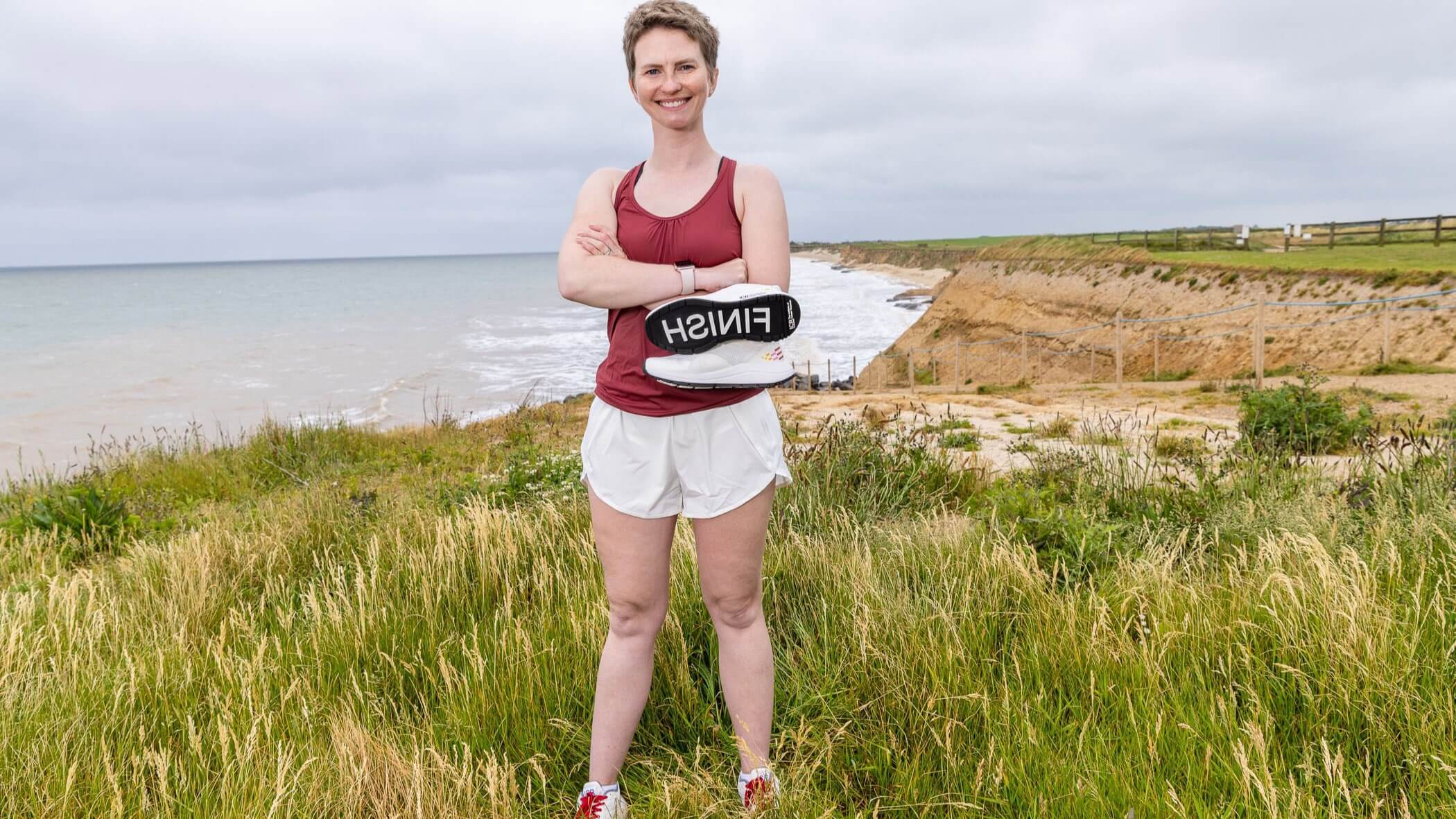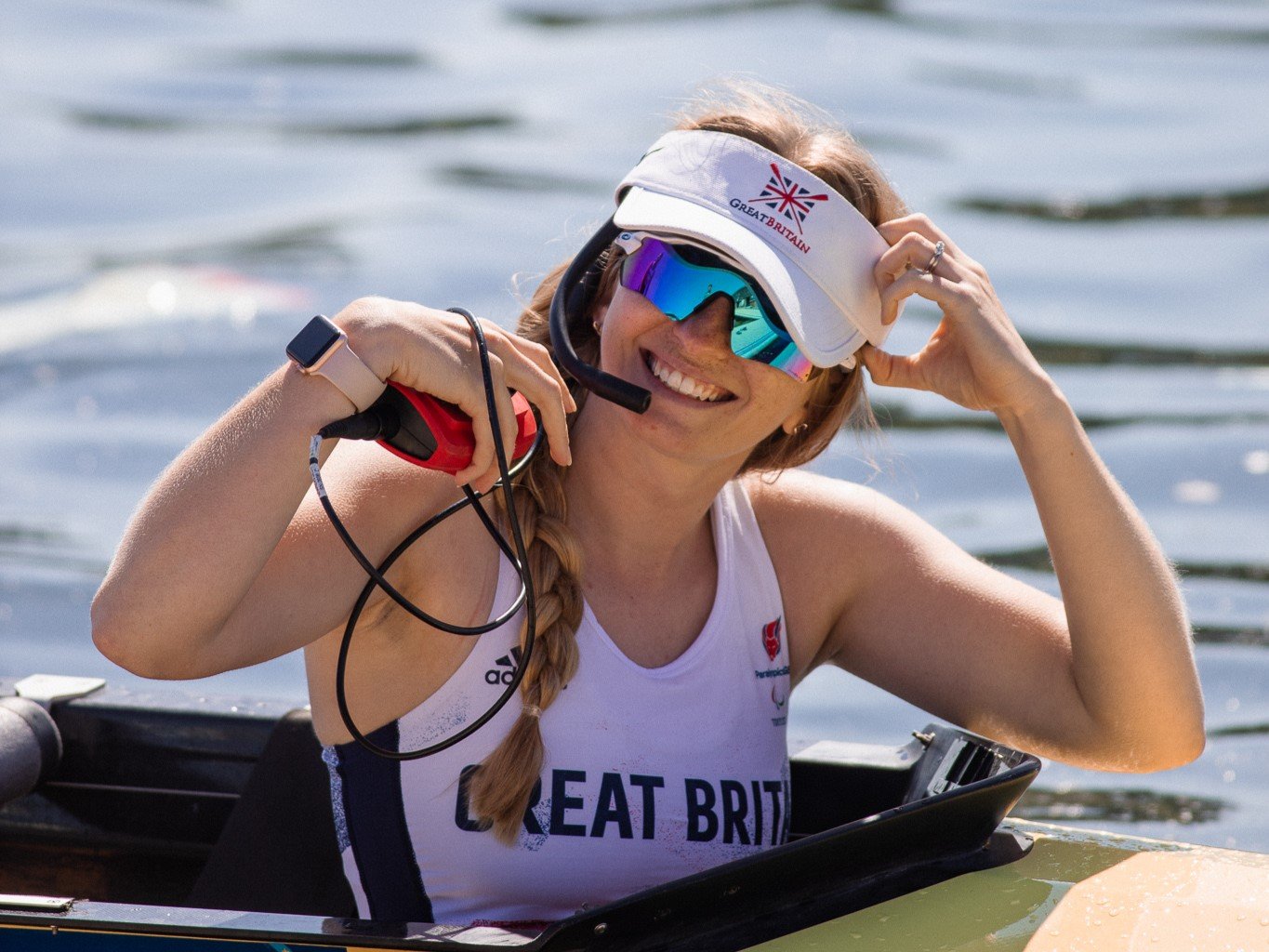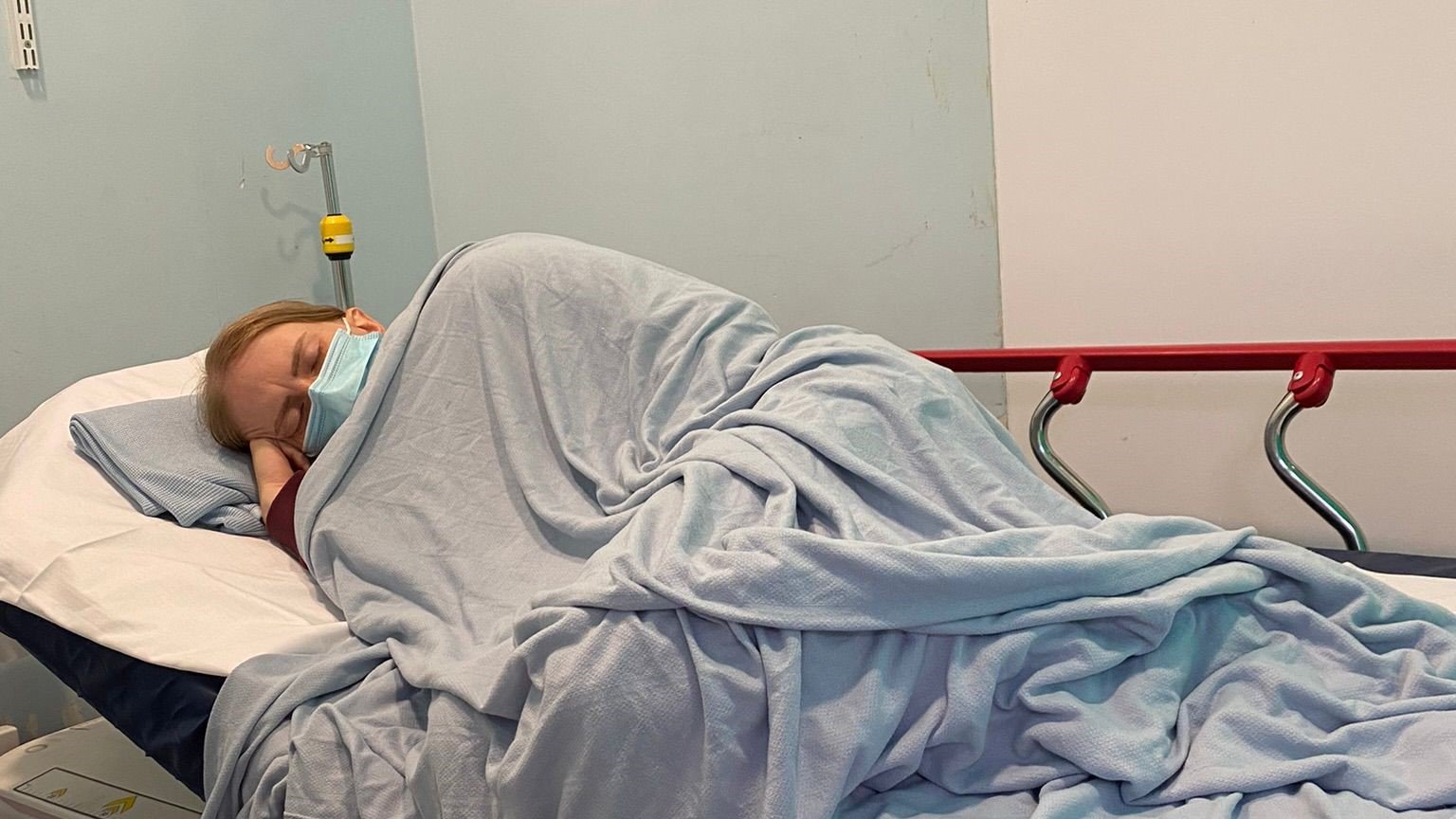
Image: Erin taking part in our Finish Cancer campaign. Credit: Institute of Cancer Research/John Angerson
My cancer diagnosis came as a complete surprise to me. In August 2021, I had coxed the British Rowing team to a gold medal at the Tokyo Paralympics. I took a few months off after the Games and returned to training in January 2022.
I was fitter and healthier than ever and was preparing for the coming season, which involved more World Cups, and the European and World Championships, and my sights were set on Paris in 2024.
I was on a training camp in Italy and realised something was wrong when I was in a shower. It was a tiny lump on the top of my left breast. With a history of breast cancer in my family, I actively check my breasts and I hadn’t noticed it before. I realised I needed to get it looked at and had an appointment arranged for my return.
I came back from training camp and had just 10 days before I was due to compete at the World Cup in Serbia. In that time, I had biopsies taken and a number of appointments before it was confirmed it was breast cancer. It was a whirlwind 24 hours as I had to take in the diagnosis, speak to my parents and my husband's parents, and then to my team as well.
The day after the diagnosis I flew to Belgrade - I still wanted to go to compete.
I put my diagnosis to one side

Image: Erin representing Team GB as Paralympic coxswain. Credit: Erin Kennedy
It was very surreal because my direct team knew, along with the leadership team, but most of the wider group didn't know. I wanted to have a normal race and that ended up being a really good thing for me. I was able to put my diagnosis to one side and enjoy my job - I didn't know when I’d be able to come back to it.
From my diagnosis, I knew that I was going to have chemotherapy. And I knew it would be prior to surgery, so it would be soon. By this stage, I knew that my cancer was probably triple negative, which I now know is increasingly common in younger women. But I didn’t know what the full treatment would be and I didn’t know what the future held.
Amazingly, we won the World Cup! Once I came home, my mind turned towards my diagnosis and the treatment in front of me.
I didn’t want to lose my identity
I was transferred to the Royal Surrey Hospital in in Guildford and was accepted into their Teenage and Young Adult unit there, as I was 29 and they luckily take patients up to the age of 30.
My husband and I don’t have children and we were able to access fertility preservation services at Guys Hospital in London so that we might be able to have a biological family in future. This was a whirlwind in itself - on 12 July I had a procedure to harvest my eggs and then I started chemo the next day.
It was a lot to deal with, but I am very lucky - my husband was fantastic – we’ve been together since we were 17 and he has been incredible. My family and in-laws are so supportive and quite close by which also helped.
I made a decision quite early on that I didn't want to lose my identity and stop doing all the things I love simply due to cancer. I also wanted to maintain my independence for as long as possible - and I would never have been able to do that without the support of my friends and family and the amazing team at the Royal Surrey.
I competed while on chemotherapy

Image: Erin undergoes chemotherapy. Credit: Erin Kennedy
My treatment started with four rounds of EC chemotherapy, then 12 rounds of paclitaxel chemotherapy, and every third week had I carboplatin as well. I responded really well and even managed to go and compete at the European Championships while I was on chemo, which was a huge achievement for me.
I decided that would be the end of my season, so I didn’t do the World Championships two months later. I was still training, but as I got deeper into treatment, it was more for the social aspect. It was tough to step away from the Worlds, but it was definitely right for my treatment.
After I finished chemo at the start of December 2022, I was able to start spending my time on the things that were really important to me and I had some really great things to look forward to.
I was awarded an MBE and I was well enough to go and collect that from Windsor, attend a reception for athletes at Buckingham Palace and I also attended Sports Personality of the Year which is always so much fun!
In January 2023 I had a double mastectomy and a partial reconstruction with expander implants. I had been very nervous about the impact of mastectomy and how long I would be away from training, but choosing the surgery wasn’t a hard decision for me. By then I’d found out that I had a mutation in my BRCA1 gene, which meant my cancer lifetime risk was significantly increased.
I wanted to get better so I could compete again
Surgery is a challenge as there is so much you cannot control - I was concerned about how I would recover from the surgery and I wanted to get better so I could compete internationally in 2023 – the year before the Paris Olympics. I did everything I could to be the best patient.
After surgery I just lay on the sofa and did nothing for around a month – apart from my exercises three times a day – and focused on letting my body heal. I was able to start getting back to training in March and I went on training camp at the end of April to Italy, which was a huge achievement.
I was selected for the European Championships in May, which took place in the beautiful Lake Bled in Slovenia. Exactly a year on from my diagnosis I was competing again – and my team won the European Championships. It was a huge moment for me. I haven’t been emotional around my whole diagnosis and treatment experience because I’m very practical and like to take one step at a time. I was incredibly emotional when we won - it felt like I had come out the other side.
.jpeg)
Image: Erin continued to compete, during and after treatment. Credit: Benedict Tufnell
I’m in a very good place now
Now I’m back to training for the Paris Games after winning gold at the World Championships. And recently I had the final phase of my reconstructive surgery.
I’m in a very good place at the moment. Before my last chemo session I was told that I’d had an excellent response to treatment, and in March this year I was told that there was no evidence of cancer in my body.
I’m very grateful for all the research that has been done to discover and develop effective treatments. I’m especially thankful to The Institute of Cancer Research for their research into triple negative breast cancer – the type I was diagnosed with – because it’s generally very under-researched. An increasing number of young women are diagnosed and with this type of breast cancer and it’s great to see the ICR doing fantastic work in this area.
Supporting the ICR was a no-brainer
.jpeg)
Image: Erin and Greg Rutherford launch our Finish Cancer campaign. Credit: Institute of Cancer Research/John Angerson
When The Institute of Cancer Research asked me to be involved in the Finish Cancer campaign it was a no-brainer – I felt if I could raise awareness and funds to make a difference to even one person facing this awful disease, it would mean the world.
Together with Olympian Greg Rutherford, I launched an inspirational race, across 100 miles of coastline, to print the words ‘FINISH CANCER’ in the sand 167,000 times – to represent the number of people who die of cancer every year in the UK.
This was a reminder that I was so fortunate to receive the all clear – but I know not everyone is this lucky. My experience has highlighted to me just how vital cancer research is, to ensure more people have the hope of a cure.